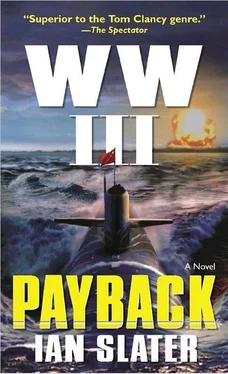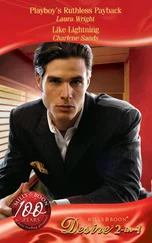The only thing that mattered was that he, Aussie, and Choir, upon exiting through one, and Sal, Brody, and Lee through two, remembered every detail of the attack plan. Speed and precision were paramount. Five minutes after “hatches open,” the general, Aussie, and Choir should be racing up the Y’s stem and turning left on the Y’s southern arm, Salvini, Bone, and Johnny Lee swinging right, onto the Y’s northern arm, the general’s trio responsible for entering the warehouse at its southern end. At the same time, the plan called for Bone to position himself on a SATPIX-chosen rise closer to the coast road, near the northern entrance of the warehouse. There, he should be able to provide covering fire for teammates Salvini and Lee at the northern end of the building and be able to sweep the coast road with his squad automatic weapon should any PITAC, pain-in-the-ass civilian, be up and around on the predawn road between Kosong, a mile to the north, and the DMZ, ten miles to the south. Meantime, the general’s trio at the building’s northern end would also be provided with suppressing fire from Choir Williams’s SAW.
However, whatever happened, aboard the RS Gomez and Eddie Mervyn had been told by Freeman to allow no more than twenty-five minutes for the operation: “Five minutes up, ten minutes to shoot and loot evidence of MANPAD storage, five minutes back to the beach. Five minutes max for unseen contingencies.” If they weren’t back at the RS by then, Gomez and Mervyn would reverse from their submerged though shallow surf-hide into deeper water, execute a quick 180-degree turn, and head back to the McCain ’s battle group at full speed. The humiliation of a botched attack would be tenfold if the NKA somehow managed to either damage or capture America’s most highly secret combat watercraft.
The General’s night-vision goggles were jarred by his leap from the RS’s roughed “step-off” that Gomez had dutifully deployed starboard below hatch one. But the blur caused by the jarring was quickly countered by the NVGs’ MEDs — microscopic electronic dampeners — and he had as good a picture of the half-mile-long banana-shaped beach as he was going to get. Its foreshore was littered by gale-blown flora, including bushes and ghostly tree trunks whose bark had been stripped, the trunks tossed and driven farther south from Siberia in the storm’s surge. Aussie, gripping his Heckler & Koch submachine gun, and Choir, his SAW, followed the general out of hatch one, and off the RS’s starboard side Salvini led Bone and Johnny Lee off the port side of hatch two, the six men crossing the beach, linking up in single file at the base of the Y, a fifteen-foot gap between the first three, led by Freeman, Salvini’s trio behind.
The only sound was that of surf and the steady pouring of rain, the Vibram-soled combat boots of the six men barely audible in the soft, course sand, then the slightly noisier footfalls on the crushed-gravel yard-wide stem of the Y trail and — they weren’t sure.
Freeman didn’t hear it, the legendary general loath to admit that in recent years his hearing in the 2,000-plus hertz range wasn’t what it used to be in the days when he could hear the squeak of a Soviet tank’s treads in soft snow a mile away in the taiga. But Aussie Lewis heard something other than the rain pelting down on the hard leaves of camphor laurel trees and the sustained roar of the sea a hundred yards behind them. He stopped, tapped the general’s shoulder, and gave the hand signal for the others to halt.
With the sound of their footfalls silenced, everyone in the two three-man squads of the hit team could also detect the faint yet distinct two-stroke lawn-mower-like whine, whose persistence could be heard above the sound of the unrelenting rain upon the dense bush of the slope and the pounding of the surf. A blur dashed across the trail in front of the general — a hare. Now the noise was not confined to one engine but a number of them. “Motorbikes,” Aussie whispered to Freeman in front of him, then signaled the same to the four men behind by using the American Sign Language Freeman had insisted they all learn.
Bone Brady nodded, recognizing the sound of all-terrain vehicles, reckoning there must be at least half a dozen of them, or more. Were they one-rider ATVs, Freeman wondered, or two-man vehicles? If the latter, the odds were already two to one against the team if the ATVs, which sounded to the general as if they were about a quarter mile away, were heading in the direction of the beach. Or maybe they were just passing by on a regular ATV patrol along the coastal road. Indeed, the noise seemed to be abating.
Freeman knew there were only three choices: wait, abort, or attack. He’d already used up fifty seconds of Payback’s precious twenty-five-minute window. His pause was only a few seconds long, but seemed like an eternity to Johnny Lee, just down the slope behind him. The general signaled the team to proceed slowly in crouch position.
The first North Korean they saw through their rain-slashed night-vision goggles was an unusually tall soldier, a lieutenant, given his helmet insignia, the man standing atop a molehill-shaped rock with an evil-eye slit across its seaward front. A bunker. The NKA lieutenant, standing about two feet above the machine-gun’s redoubt, did not have night-vision goggles, Freeman noted, but was staring out to sea through big ChiCom-issue IR binoculars. Freeman could see that behind the Korean there was a clutch of about eight ATVs, a final duo of the machines arriving, cutting their engines, the ghostly wooden warehouse twenty yards or so beyond. Suddenly there was no more ATV noise.
Lieutenant Rhee turned around in the pouring rain to admire the last arrivals of the complement of what were now ten Red Dragon ATVs, not quite half the number he had requested, but, he mused, better than nothing. From habit on the DMZ night patrols, he sniffed the air for any sense of alien presence, but all he could smell on the wind was the faint aroma of kimchi — no doubt, he thought, coming from his machine gunner and the gun’s ammo feeder in the bunker directly below him.
In about three seconds, thought Aussie, the North Korean lieutenant was going to turn his head back toward the ocean and see them. What in hell was the general—
A fierce, choking rattle rent the sodden air, as one-in-five white tracer rounds erupted from Freeman’s AK-47, taking down the tall Korean and thudding, with their peculiarly brutal sound, into the clump of surprised ATV riders. An instant later another long burst of AK-47 rounds whistled through the air, this enfilade fired by the Koreans at the general’s trio, who quickly dispersed left of the trail, going to ground as the NKA’s submachine-gun bullets whistled over their heads before thumping and chopping into the surrounding brush. The overwhelming temptation for Salvini, Bone, and Lee was to do the same as Freeman’s trio, only to move right of the trail instead of left, taking up defensive positions in the thick cover. But the tactic the general had so meticulously planned was for him, Aussie, and Choir to attack the southern end of the MANPAD warehouse, Salvini, Bone and Lee to attack the northern end. The general wasn’t averse to changing plans midstream if circumstances warranted it, but the heavy rain and the fact, which he and Aussie had already noted, that the North Koreans seemed not to be wearing night-vision equipment argued against any radical departure from the plan.
“Go!” yelled Freeman, dispelling any doubt the other five might have had about whether or not they should dig in. The sound of his stentorian voice overriding the storm’s own assault sent the team into overdrive. It was in these rushing moments that Freeman’s SpecFors’ endless physical training resulted in what Aussie Lewis had once described as the team’s ability to run “faster’n a fucking Enron accountant,” and with full, C4-loaded packs. It was a bad analogy, Choir had told him. Enron ran from trouble, SpecFors ran into it, like the firemen on 9/11.
Читать дальше












